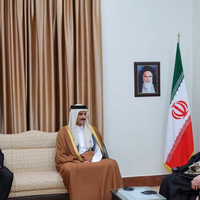The six candidates, handpicked by the regime, have so far confined their campaigns to free appearances on state television, participating in dull interviews that have failed to engage or motivate viewers.
It appears the Islamic Republic has run out of politicians who can effectively communicate with the public. The same familiar faces appear on television news daily, offering generic statements like, "We need to use all potentials to turn threats into opportunities!" These platitudes are repeated about nearly every issue, from increasing wheat production or imports to addressing the need for higher salaries and reducing the 50% annual inflation rate.
In the TV interviews, the candidates are often seen sitting, appearing as if they are in great agony. Smiles are rare, as are new and interesting comments or any sense of humor.
The interviewers seem hesitant to ask serious questions about anything. Foreign policy and the nuclear issue are not discussed, suggesting they have been perhaps instructed to avoid sensitive topics. For the first time, state television has openly acknowledged censoring candidates' statements. In at least one instance, the broadcast of an interview with candidate Mohammad Bagher Ghalibaf was delayed for this reason.
The only candidate who has so far been observed to try to be charming is right-wing cleric Mostafa Pourmohammadi who is being presented as a 'moderate" candidate. He was brave enough to speak against restrictions on social media.
The cleric is the only one of the six candidates who occasionally manages to smile, a stark contrast to his 45 years of habitual frowning. Additionally, he stands out for his well-tailored clerical robes and good taste in color coordination, a notion seemingly loston the other candidates.
He is the only candidate with an organized campaign and a campaign manager well-known to Iranians interested in cultural issues. His campaign manager, Hojjatollah Ayubi, is recognized as one of the most liberal officials the Islamic Republic has ever had in the area of cinema. In contrast, other candidates have typically selected individuals with military or political backgrounds. These factors make Pourmohammadi, who has a controversial background in the judiciary, security, and intelligence affairs, stand out among the six candidates.
Unlike the other candidates, he is transparent about his association with Nameh News, the website that supports him and which he has always been behind. In contrast, other candidates have never publicly associated themselves with the numerous media outlets that serve their interests and are often funded by the government. For instance, Hamshahri newspaper and its affiliated publications support Mayor Zakani, while the hardline websites Raja News and Mashregh News advocate for Jalili's candidacy.
Massoud Pezeshkian likely has the best access to media, with the Reform Front endorsing his candidacy. His images are prominently featured in the two centrist dailies, Ham Mihan and Sazandegi, although these publications occasionally criticize him for one or two mistakes.
Next week the campaign scene will probably change as candidates are to face each other in televised debates. Unlike current interviews that are being aired in a fragmented way from various channels with varying degrees of popularity and viewership and deprive the candidates from being seen by the right viewers at the right time, the debates will be aired from the key channels such as the news channel IRINN at a time that suits most viewers.
State TV has openly stated that it will moderate the debates and has warned candidates to avoid controversial and sensitive issues. However, it will be difficult for most candidates to appear as timid as they do in the interviews, as they might have to respond to accusations and counter-accusations.
But will they have anything different and interesting to say? That remains to be seen. Will the public pay attention to the candidates and their statements? That is an even bigger question.









